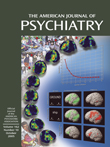Deficits on a Probabilistic Response-Reversal Task in Patients With Pediatric Bipolar Disorder
Abstract
OBJECTIVE: Patients with bipolar disorder become hyperhedonic when manic and anhedonic when depressed; therefore, it is important to test whether patients with bipolar disorder show deficits on behavioral paradigms exploring reward/punishment mechanisms. METHOD: A probabilistic response-reversal task was administered to 24 bipolar children and 25 comparison subjects. RESULTS: Patients made more errors during probabilistic reversal, took longer to learn the new reward object, and were less likely to meet the learning criterion. CONCLUSIONS: Children with bipolar disorder may have a reversal learning deficit.



